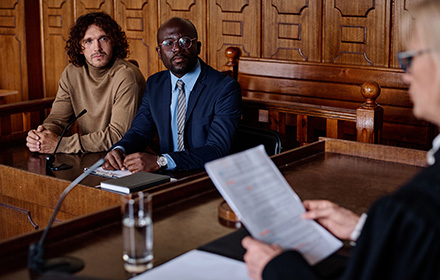Can Police Search Your Phone During A Traffic Stop?
August 25, 2025
Your phone holds your texts, photos, emails, financial records, and even your location history. So, when you're pulled over by police, you might wonder: Can police search your phone during a traffic stop? The answer isn't as simple as yes or no—and what happens next can significantly impact your privacy and your rights.

At Donet, McMillan & Trontz, P.A., our Miami-based criminal defense attorneys are frequently called on to defend individuals whose phones were searched during routine stops. Understanding when police are allowed to access your device is essential to protect yourself from illegal searches and potentially serious criminal charges.
Your Fourth Amendment Rights
The Fourth Amendment to the U.S. Constitution protects individuals from unreasonable searches and seizures. This means that, in most cases, law enforcement must have a warrant to search your phone—even if they've pulled you over for a traffic violation.
The U.S. Supreme Court made this clear in the 2014 landmark case Riley v. California, where the Court ruled that cell phones cannot be searched without a warrant, even if a person is arrested.
So, during a traffic stop, unless an exception applies, police cannot lawfully search the contents of your phone without a warrant.
When Can Police Search Your Phone Without a Warrant?
While a warrant is usually required, there are a few exceptions where officers might be able to search your phone:
1. You Give Consent
If you voluntarily hand over your phone or unlock it for officers, you're legally consenting to the search. This means you're giving up your Fourth Amendment protections at that moment. It's your right to politely decline and say, "I do not consent to a search."
2. Exigent Circumstances
If police believe there's an immediate threat to public safety or that evidence may be destroyed, they may conduct a limited search. However, this is a narrow exception and is often challenged in court.
 3. Search Incident to Arrest
3. Search Incident to Arrest
Even if you're arrested during a traffic stop (for example, due to an outstanding warrant or suspected DUI), the Supreme Court has said that police still need a warrant to search your phone, even after your arrest.
What About Phone Location Data?
Law enforcement may try to obtain cell phone location data (historical or real-time) during or after a stop. However, in Carpenter v. United States (2018), the Supreme Court ruled that accessing this type of data without a warrant violates the Fourth Amendment.
So, if you're being investigated for a crime and law enforcement tries to use your phone's GPS data against you, it must be obtained legally—or it could be excluded from evidence.
What Happens If Police Illegally Search Your Phone?
If officers search your phone without a warrant or valid legal justification, your attorney can file a motion to suppress the evidence. If the court finds the search unconstitutional, any evidence gathered—texts, photos, messages, or location data—may be ruled inadmissible in court.
At Donet, McMillan & Trontz, P.A., our attorneys routinely challenge illegal searches and fight to have tainted evidence dismissed, especially in drug cases, fraud investigations, and federal offenses where phones are often central to the prosecution's case.

How Donet, McMillan & Trontz, P.A. Can Help
If your phone was searched during a traffic stop, and you're now facing criminal charges or under investigation, it's critical to act fast.
Our firm has more than 50 years of combined experience representing clients across Miami-Dade County and throughout Florida in cases involving:
- Illegal search and seizure.
- White-collar crimes.
- Digital forensics and device data.
- State and federal investigations.
- Possession of child pornography or transportation of child pornography.
We evaluate every detail of the stop, arrest, and investigation to determine if your rights were violated. If they were, we take immediate legal action to defend your freedom.

Final Thoughts
So, can police search your phone during a traffic stop? Legally, they cannot do so without a warrant or valid exception. Your phone is protected by the Constitution, but only if you know your rights and assert them wisely.
If you've experienced a phone search during a traffic stop or are worried about what law enforcement might access, don't face it on your own.
📞 Contact Donet, McMillan & Trontz, P.A. today at
(305) 444-0030 or visit
www.dmtlaw.com for a confidential consultation. We're here to protect your rights—and your future.





















